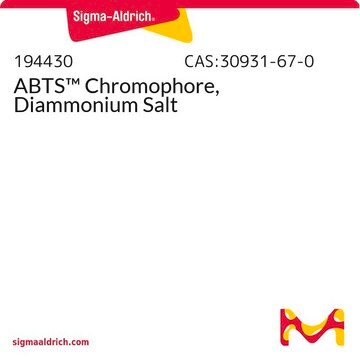A1888
2,2′-Azino-bis(3-ethylbenzothiazoline-6-sulfonic acid) diammonium salt
≥98% (HPLC), chromogenic, powder
Synonym(s):
AzBTS-(NH4)2, Diammonium 2,2′-azino-bis(3-ethylbenzothiazoline-6-sulfonate)
About This Item
Recommended Products
product name
2,2′-Azino-bis(3-ethylbenzothiazoline-6-sulfonic acid) diammonium salt, ≥98% (HPLC)
Quality Level
Assay
≥98% (HPLC)
form
powder
solubility
water: 10 mg/mL, clear to slightly hazy
storage temp.
2-8°C
SMILES string
[NH4+].[NH4+].CCN1C(\Sc2cc(ccc12)S([O-])(=O)=O)=N\N=C3/Sc4cc(ccc4N3CC)S([O-])(=O)=O
InChI
1S/C18H18N4O6S4.2H3N/c1-3-21-13-7-5-11(31(23,24)25)9-15(13)29-17(21)19-20-18-22(4-2)14-8-6-12(32(26,27)28)10-16(14)30-18;;/h5-10H,3-4H2,1-2H3,(H,23,24,25)(H,26,27,28);2*1H3/b19-17-,20-18-;;
InChI key
OHDRQQURAXLVGJ-AXMZSLBLSA-N
Looking for similar products? Visit Product Comparison Guide
General description
- ABTS together with hydrogen peroxide for reaction with peroxidase enzymes (like HRP for example).
- ABTS together with laccase or bilirubin oxidase.
ABTS mainly used in ELISA (enzyme-linked immunosorbent assay) procedures.
A peroxidase reaction of ABTS in the presence of hydrogen peroxide produces a green soluble end product which can be read spectrophotometrically at 405nm. The reaction may be stopped with 1% sodium dodecyl sulfate (SDS).††† ABTS, 2,2′-Azino-bis(3-ethylbenzothiazoline-6-sulfonic acid) diammonium salt is light sensitive.
Application
- 2,2′-Azino-bis(3-ethylbenzothiazoline-6-sulfonic acid) diammonium salt has been used as a substrate in ELISA (enzyme-linked immunosorbent assay).
- ABTS is significantly used by the food industry, to measure the antioxidant capacities within different foods.
- ABTS is also used to monitor glucose concentrations in different solutions including blood serum.
- It is recommended for ELISA (microwell) procedures, not recommended for membrane applications.Since it is less readily oxidized than TMB and OPD substrates, ABTS is less sensitive for ELISA applications. Thus ABTS has some advantageous over TMB and OPD in cases of large background results.
Storage Class Code
11 - Combustible Solids
WGK
WGK 3
Personal Protective Equipment
Certificates of Analysis (COA)
Search for Certificates of Analysis (COA) by entering the products Lot/Batch Number. Lot and Batch Numbers can be found on a product’s label following the words ‘Lot’ or ‘Batch’.
Already Own This Product?
Find documentation for the products that you have recently purchased in the Document Library.
Customers Also Viewed
Articles
NBT-BCIP substrate system aids in western blotting and immunohistological staining, producing a blue-purple insoluble end product.
NBT-BCIP substrate system aids in western blotting and immunohistological staining, producing a blue-purple insoluble end product.
NBT-BCIP substrate system aids in western blotting and immunohistological staining, producing a blue-purple insoluble end product.
NBT-BCIP substrate system aids in western blotting and immunohistological staining, producing a blue-purple insoluble end product.
Our team of scientists has experience in all areas of research including Life Science, Material Science, Chemical Synthesis, Chromatography, Analytical and many others.
Contact Technical Service










